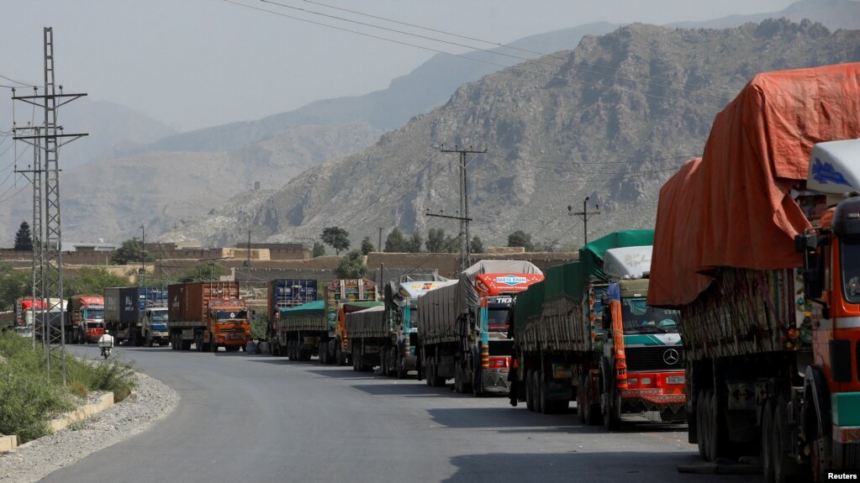RASC News Agency: More than three weeks after the closure of key border crossings between Afghanistan and Pakistan, both nations are facing severe economic fallout, with total financial losses now exceeding $200 million, according to a report published Monday by Pakistan’s The Nation newspaper.
The standoff, which began on October 11, has paralyzed cross-border trade routes that serve as lifelines for both economies disrupting food supplies, freezing transport networks, and stranding thousands of cargo trucks on either side of the frontier.
At least eight official crossings, including Torkham, Spin Boldak, Ghulam Khan, and Angoor Adda, remain sealed amid escalating border tensions. Sources from both Afghanistani and Pakistani trade unions told The Nation that between October 12 and 31 alone, more than $50 million in direct losses were incurred by shipping companies and logistics firms.
The blockade has not only crippled bilateral trade but also created an escalating humanitarian and inflationary crisis inside Afghanistan. Imported goods, fuel, and construction materials have sharply risen in price, while tons of perishable agricultural products are rotting in warehouses and parked vehicles along the border.
Before hostilities intensified, Afghanistan imported approximately $150 million worth of goods from Pakistan each month while exporting roughly $60 million. That flow has now ground to a halt.
Economists warn that the prolonged closure could trigger a cascade of socio-economic instability. Shortages of essential commodities, rising unemployment, and further depreciation of the Afghanistani afghani are already being reported in several provinces.
“The Taliban administration’s failure to negotiate a swift resolution exposes the regime’s lack of diplomatic and logistical capacity,”
said one Kabul-based economic analyst who requested anonymity.
“This isn’t just a trade crisis it’s a test of governance that the Taliban are clearly failing.”
Business chambers in both countries have urged immediate talks to reopen trade routes, emphasizing that the current impasse threatens thousands of livelihoods and risks inflaming political tensions between Kabul and Islamabad.
The closure has also struck a blow to Pakistan’s broader regional ambitions, particularly its aspiration to serve as a transit hub connecting South Asia to the markets of Central Asia. With the main trade arteries to Afghanistan blocked, Pakistani exporters are losing both revenue and credibility among regional partners.
Several Pakistani business leaders have publicly warned that if the crisis continues, Islamabad’s position in major transcontinental infrastructure projects such as the China–Pakistan Economic Corridor (CPEC) and CASA-1000 energy network could be severely undermined.
“Every passing day of closure not only costs millions but damages Pakistan’s reputation as a reliable trade corridor,”
said a Karachi-based trade union spokesperson.
“We are watching years of investment and trust evaporate because of political stubbornness and mismanagement.”
Inside Afghanistan, the economic toll is increasingly visible. Farmers and exporters report catastrophic losses as fresh fruit, vegetables, and dry goods destined for Pakistani markets spoil in storage. In Kandahar and Nangarhar, producers of pomegranates and grapes major export commodities say their entire harvests may be lost this season.
The Afghan Chamber of Commerce and Investment has appealed to both governments to end what it calls a “politically motivated trade blockade” that is destroying livelihoods and eroding already fragile economic resilience.
“For a landlocked country already struggling under isolation, every day of border closure pushes Afghanistan deeper into crisis,”
said Abdul Malik Faizi, a senior member of the chamber.
“The Taliban leadership’s inaction is costing our traders, our farmers, and our future.”
Observers warn that continued border closures could further inflame an already volatile political landscape. Relations between Islamabad and Kabul have deteriorated sharply in recent months following a series of deadly cross-border skirmishes and Pakistan’s accusation that the Taliban are harboring militant groups responsible for attacks inside Pakistani territory.
Economic experts caution that without an immediate de-escalation, the standoff could spill over into a regional economic and security crisis, drawing in Central Asian states that depend on cross-border transit for trade and energy flows.
“The border has become a pressure valve for both political and economic frustrations,”
said Dr. Laila Sidiq, a regional affairs analyst.
“Each closure pushes the region further from cooperation and deeper into confrontation.”
As diplomatic channels remain stalled, thousands of stranded drivers, merchants, and workers wait in uncertainty at the shuttered gates of Torkham and Spin Boldak symbols of a frozen relationship between two interdependent yet distrustful neighbors.
What began as a temporary border closure has now evolved into a multi-million-dollar economic siege one that exposes not only the fragility of trade in South Asia but also the deep political fissures that continue to divide Kabul and Islamabad.






